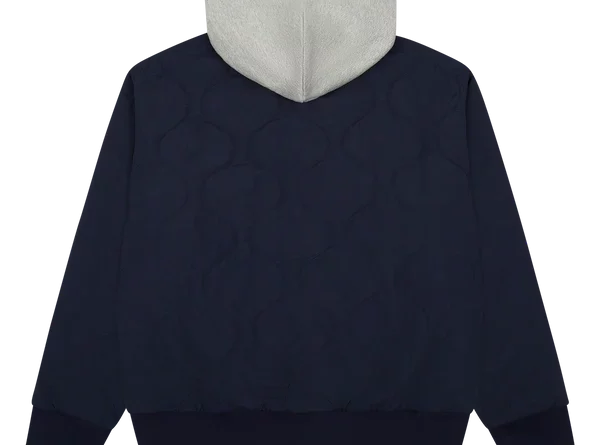Denim Tears The Story Behind the Brand and its Cultural Impact
Denim Tears is a fashion brand that has rapidly made a significant mark in the contemporary streetwear and luxury fashion scene. Known for its innovative blend of street culture, social commentary, and high-quality craftsmanship, Denim Tears is more than just a clothing label. It represents a cultural movement, embodying themes of history, identity, and resistance, while simultaneously reimagining classic Americana through a modern lens.
Founded by designer Tremaine Emory in 2019, Denim Tears was born from a desire to tell deeper, more nuanced stories through fashion. Emory, who had worked with various notable brands and designers, sought to create a brand that was not just about the clothes but the meanings behind them. The name “Denim Tears” itself speaks to the complex relationship between the American identity and the experiences of Black Americans, particularly in relation to denim—the fabric that has been both a symbol of labor and a marker of working-class identity in America.
The Birth of Denim Tears
Tremaine Emory’s journey into fashion was influenced by his background and the stories he wished to tell through clothing. A former creative director for Supreme, Emory has deep ties to street culture, and his previous experiences shaped his approach to design. Denim Tears, however, gave him the opportunity to create a brand that was more personal, deeply rooted in the history and struggles of the African American community.
Denim Tears’ first collection showcased a bold and poignant use of symbolism, weaving together the history of Black America with the American garment industry. Emory’s designs were often inspired by the cotton fields of the American South, slavery, and the broader history of African Americans, particularly focusing on the legacy of systemic oppression. One of the standout elements in early collections was the prominent use of cotton imagery, with embroidered cotton flowers or patches featuring symbolic references to the oppression of Black people.
Denim Tears sought to transform the perception of denim from just another fabric used in everyday wear into a powerful symbol of resistance and struggle. By incorporating this fabric into designs that were rooted in Black history, Emory forced the wearer and the viewer to confront the hidden stories within the American fabric—literally and figuratively.
A Fusion of Street Culture and High Fashion
What sets Denim Tears apart from other fashion brands is its ability to merge streetwear with high-end fashion sensibilities. Tremaine Emory’s expertise in both realms allows him to create pieces that are wearable yet highly expressive, making Denim Tears both accessible and aspirational.
In the realm of streetwear, Denim Tears speaks to the youth culture’s desire for self-expression and authenticity. The brand’s pieces are often adorned with iconic graphics, bold typography, and political symbols that resonate deeply with young consumers. At the same time, Denim Tears appeals to luxury fashion enthusiasts due to its superior craftsmanship, premium materials, and subtle nods to high-fashion aesthetics.
One of the brand’s most iconic collaborations was with Nike, where Emory infused his signature cotton flower motif into limited-edition sneakers. This collaboration not only bridged the gap between streetwear and sportswear but also amplified Denim Tears’ message of unity and social consciousness. The success of the Nike partnership demonstrated that the brand’s mission wasn’t just resonating with a niche audience but was striking a chord on a global scale.
Cultural Commentary and Social Justice
The role of Denim Tears in addressing social justice issues cannot be understated. Emory has consistently used his platform to shed light on historical and contemporary issues, particularly those affecting Black people. The cotton motif, for instance, has been a significant part of his design vocabulary, drawing a direct line between the economic exploitation of enslaved Black people and the wealth generated by industries that relied on their forced labor.
One of the most powerful moments for Denim Tears came in 2020 when Emory released a collection called “Cotton Wreath,” which highlighted the cotton flower as a symbol of slavery’s deep roots in the United States. The cotton wreath was a direct homage to the historical exploitation of Black laborers, particularly in the South, where cotton was grown and harvested by enslaved people. This collection became not only a fashion statement but also a political one, urging viewers to reconsider the history of the fabric that had been a staple of American life for centuries.
Emory’s commitment to social justice also extended beyond his designs. He has often used his platform to support causes such as racial equality, voting rights, and economic justice for marginalized communities. Denim Tears has collaborated with various non-profit organizations, contributing both funds and awareness to critical social issues. By doing so, Emory has ensured that Denim Tears remains more than just a brand—it is a movement that encourages conversation and action around systemic racism and inequality.
The Symbolism of Denim in Denim Tears
Denim, often associated with working-class uniforms, has a deep cultural significance. The material, which is woven from cotton, has a longstanding relationship with the American dream and the idea of hard work. However, Denim Tears recontextualizes denim, asking us to think beyond its associations with manual labor and durability.
In the case of Denim Tears, denim serves as a visual metaphor for the struggles and resilience of Black Americans. The choice of fabric speaks to the intersection of class, race, and labor, while the tears in the denim—a motif often seen throughout Emory’s collections—represent both the pain and the endurance of those who have faced historical injustices. Denim Tears thus becomes an act of defiance, a form of resistance against a system that has long sought to erase the experiences and contributions of Black people.
Denim Tears in the Fashion World
While Denim Tears’ roots are in streetwear, its impact on the broader fashion world has been undeniable. The brand’s unique storytelling and focus on identity have caught the attention of both fashion critics and celebrities. Celebrities such as Pharrell Williams, Kanye West, and Janelle Monáe have been spotted wearing Denim Tears, further elevating the brand’s profile and positioning it as a major player in the fashion industry.
Emory’s ability to blend fashion with activism has also won him respect within more traditional fashion circles. His collections have been featured in major fashion publications, and his collaborations with companies like Nike and Levi’s have garnered significant attention. This has allowed Denim Tears to stand as both a cultural force and a commercially viable brand, bridging the gap between art, fashion, and social activism.
The Future of Denim Tears
Looking ahead, Denim Tears shows no sign of slowing down. As the fashion industry continues to evolve, Emory’s ability to blend deep cultural narratives with cutting-edge design will likely keep the brand at the forefront of both streetwear and high fashion. With increasing attention to issues of diversity, inclusion, and sustainability, Denim Tears is poised to play a central role in shaping the future of fashion, particularly as consumers become more conscious of the social and political implications of their purchasing choices.
The future of Denim Tears will likely continue to evolve along with the issues it addresses. As long as there are stories to tell, injustices to confront, and histories to reclaim, Denim Tears will remain a powerful force in both the fashion world and the fight for social change. Through its innovative designs, compelling storytelling, and commitment to cultural consciousness, Denim Tears has proven that fashion can be a tool for activism, education, and empowerment.
Conclusion
Denim Tears, under the creative direction of Tremaine Emory, has established itself as a brand that is as much about storytelling as it is about clothing. By reimagining the symbolism of denim and integrating the powerful history of Black Americans into its designs, Denim Tears has created a unique space within the fashion world. Its blend of streetwear and high fashion, coupled with a commitment to social justice, has made it a voice for those who have long been marginalized in both fashion and society. As the brand continues to grow and evolve, Denim Tears remains a testament to the power of clothing as a form of expression, resistance, and cultural change.
 Explore Our Websites
Explore Our Websites bcrelx.com
bcrelx.com



